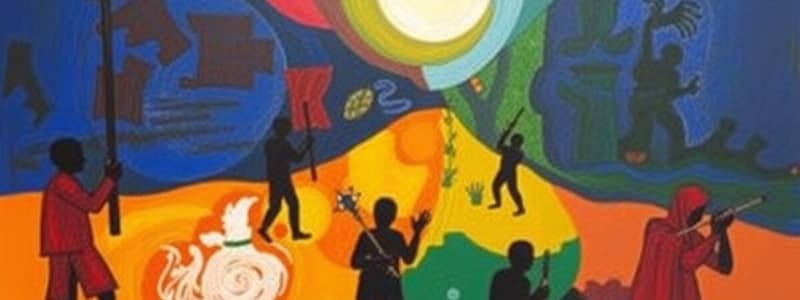Podcast
Questions and Answers
What was the primary research methodology used in the study regarding Islamic terrorism in Mozambique?
What was the primary research methodology used in the study regarding Islamic terrorism in Mozambique?
Which source was considered important for gaining insights into Islamic radical movements in Northern Mozambique?
Which source was considered important for gaining insights into Islamic radical movements in Northern Mozambique?
Why did oral sources agree to participate in the interviews under the condition of anonymity?
Why did oral sources agree to participate in the interviews under the condition of anonymity?
What role did institutional sources play in the study?
What role did institutional sources play in the study?
Signup and view all the answers
What was a significant challenge in risk communication regarding Islamic terrorism in Mozambique?
What was a significant challenge in risk communication regarding Islamic terrorism in Mozambique?
Signup and view all the answers
What is the main epistemological option presented in the research on Islamic terrorism in Mozambique?
What is the main epistemological option presented in the research on Islamic terrorism in Mozambique?
Signup and view all the answers
Which factor is highlighted as contributing to the inability to effectively manage terrorist attacks in Mozambique?
Which factor is highlighted as contributing to the inability to effectively manage terrorist attacks in Mozambique?
Signup and view all the answers
What theoretical framework is utilized to conceptualize political risk in the context of Mozambique?
What theoretical framework is utilized to conceptualize political risk in the context of Mozambique?
Signup and view all the answers
How does the research view the identity of extremist groups in Mozambique?
How does the research view the identity of extremist groups in Mozambique?
Signup and view all the answers
Which previous research is mentioned as influential in the approach to studying terrorism in Mozambique?
Which previous research is mentioned as influential in the approach to studying terrorism in Mozambique?
Signup and view all the answers
Study Notes
Islamic Terrorism in Mozambique
- Islamic terrorism has been a threat to Eastern and Southern Africa since the 1990s.
- African countries have used various strategies to combat it, ranging from military intervention to social programs.
- Mozambique lacked a specific strategy to counter terrorism, allowing radicalized Islamism to spread in Cabo Delgado Province.
- Mozambique's government, during Guebuza's second term, prioritized other threats (Somali piracy and Renamo's actions) over Islamic terrorism in Cabo Delgado.
- This was likely due to political and patrimonial interests of the political elite, and local civil society lacked the ability to resist.
- Violence increased in Cabo Delgado beginning in October 2017, with the government seemingly unable to effectively respond.
Mozambican State and Religious Conflict
- Mozambique has a history of religious tolerance and a lack of major religious conflict.
- The civil war (1976-1992) which involved Frelimo and Renamo did not have religious motivations.
- Religious diversity: 53% Christian; 19% Muslim, and 30% traditional practices.
- Although Mozambique's government permitted religion, significant restrictions were sometimes imposed during periods of socialist rule.
- Political and economic ties existed between Frelimo and sections of the Muslim community (particularly between those in the south)
- However, groups in the North, not part of these ties, experienced exclusion from power structures and thus experienced significant frustration with the government. This has contributed to the rise of extremist groups in northern Mozambique.
Mozambican State Fragility and Authoritarianism
- Mozambique is considered a fragile and authoritarian State.
- Key characteristics: centralization of power, restrictions on dissent, and a patrimonial system.
- Governmental priorities have often prioritized personal or familial interest over societal interests.
- The government has often neglected crucial signs of Islamic extremist activity, often overlooking the need for robust early intervention.
- These factors, along with the lack of civil society resistance, have exacerbated the spread of Islamic militancy.
Islamic Terrorism in Cabo Delgado
- Initially, international agencies considered the risk of Islamic insurgency to be low.
- Confidential reports demonstrated a high threat from groups actively challenging the state, beginning in the 2010s.
- The first incidents involved attacks on local police and military in and around Mocimboa da Praia.
- Early warnings were ignored and not acted on.
- There seemed to often be substantial delays between the first signs of violence and the government's response.
Studying That Suits You
Use AI to generate personalized quizzes and flashcards to suit your learning preferences.
Related Documents
Description
Explore the rise of Islamic terrorism in Mozambique and its impact on Cabo Delgado Province. The quiz examines the government's strategies, challenges faced, and the historical context of religious tolerance in the region. Understand how political interests influenced the counter-terrorism response in the country.




